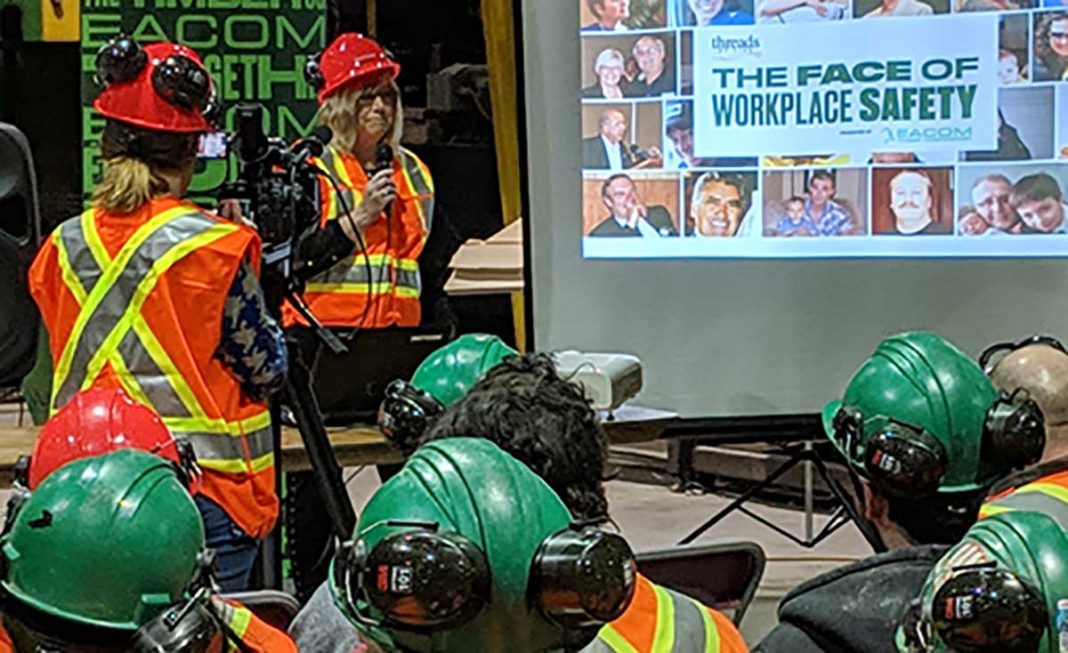The day holds particular significance with so many essential workers serving on the front lines of the pandemic
SHEGUIANDAH – It has been decades since Brent Wade, son of Joanne Wade of Sheguiandah, lost his life while driving a truck through a level railway crossing with poor visibility and the pain of her loss has been with her every day since. Ms. Wade has channeled that pain into trying to help others in dealing with the loss of a loved one or the catastrophic impacts of a life-changing workplace injury through the Association for Workplace Tragedy Family Support, aka The Threads of Life.
The National Day of Mourning is observed on April 28, but this year the normal is no longer the norm when it comes to ceremonies aimed at supporting families after a workplace fatality, life-altering injury or occupational disease.
“In a normal year, many of our speakers share their stories and many of our family members attend ceremonies to honour workers affected by workplace tragedy and many of our partner organizations host events and ceremonies,” noted Shirley Hickman, executive director and founder of the Threads of Light. “In light of COVID-19, in person ceremonies did not happen this year. Instead, Threads of Life shared a short video on our Facebook page and YouTube channel on April 28.”
Those posts featured the Threads of Life executive director sharing a little of her own story of her son Tim’s death, and showed her lighting a candle.
“In years past we have held a memorial service at the Manitoulin Legal Clinic where we could have speakers and take part in the lighting of candles for our loved ones,” shared Ms. Wade. Local dignitaries and survivors would gather and share some of their own stories and thoughts about the importance of workplace safety and the impacts of loss.
Ms. Wade travels the province to Day of Mourning events, usually sharing her story as a speaker to groups of workers. “I try to impart the importance of workplace health and safety, especially to younger workers,” she said. Youth have a tendency towards thinking things will never happen to them, she noted. “They are inexperienced, and they want to do a good job and impress their employers and colleagues,” she said. “Unfortunately, too often safety takes a back seat with younger workers and they may eschew the proper safety equipment and allow themselves to be pressed into performing unsafe work.”
For Algoma-Manitoulin MPP Mike Mantha the Day of Mourning and the following international workers’ day on May 1 hold special meaning due to his long association working in the labour movement.
“During this terrible pandemic, it is unfortunate that we cannot gather to witness in person the true devotion and support that we have all around us,” said Mr. Mantha. “Nonetheless, in our hearts we can stand in solidarity with workers across Ontario and Canada in marking an especially solemn and painful National Day of Mourning. On this day, our minds and hearts are with the thousands of health care workers, public health staff, first responders, pharmacy and grocery store staff, farmers, truckers, supply chain workers and many, many others. These are true heroes and when COVID-19 pandemic is over let’s never go back to not appreciating them—let’s never let them be taken for granted again.”
“Everyone has their own personal journey when they suffer the loss of a family member or they or a loved one are struck by a life-altering occupational injury,” said Ms. Wade. “Not everyone wants to share or be involved in a group—some just want to be left alone to deal with it in their own way.”
But for those who do wish to reach out, Ms. Wade said that she wants them to know that the Threads of Life has resources and support ready and waiting to provide a helping hand.
As for her own journey, Ms. Wade notes that it is hard for those who have never suffered such a loss, or who have never had a family member impacted by a life-altering occupational injury, to fully understand the weight of that impact on the shoulders of those who have.
She gave an example of a friend who would lose patience with her while she was attempting to deal with the loss of her son Brent. “She would say that I had to get over it, to move on with my life,” she recalled. Several years later, that friend suffered her own loss. “She came to me and apologized, saying ‘I didn’t realize’,” recalled Ms. Wade. “You don’t truly realize it until it happens to you.”
Ms. Wade said that her work now is aimed squarely at trying to ensure that occupational fatalities, injuries or diseases are not visited upon anyone else, and to raise awareness of health and safety issues that are too often ignored by those with the power to make changes.
She recalled the battle she had to convince the mayor of the community in which her son lost his life to deal with the issues at the level crossing. It wasn’t until another tragedy struck at the same location killing three young people that action was taken.
“Now there are four small white crosses where there shouldn’t be any,” she said. “It shouldn’t have to be after the fact that something gets done.” Ms. Wade urges everyone to speak up and demand action when there is an unresolved health and safety issue—and this is especially true in the current situation where essential workers are being exposed to the COVID-19 virus daily.





